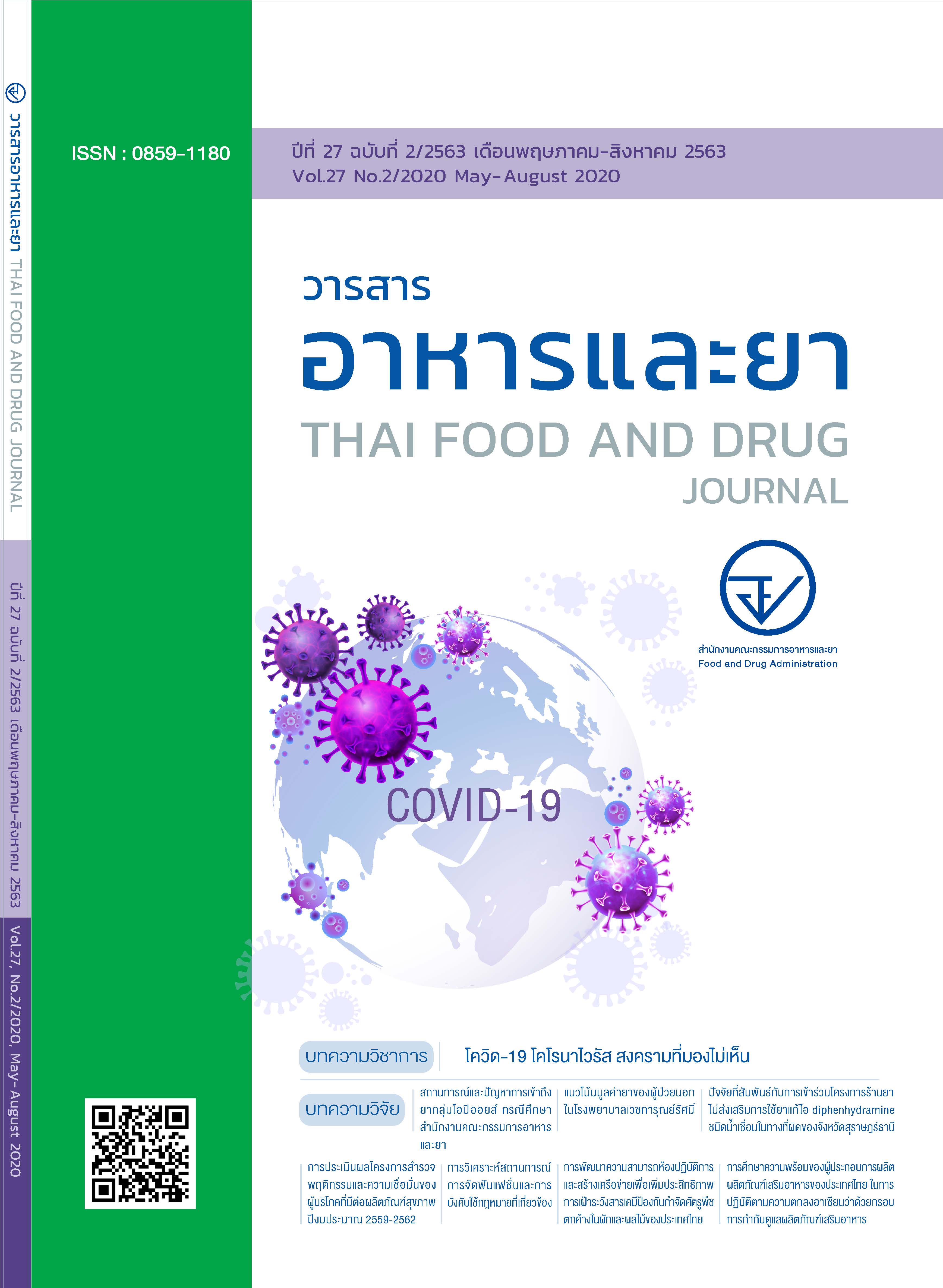การศึกษาความพร้อมของผู้ประกอบการผลิตผลิตภัณฑ์เสริมอาหาร ของประเทศไทย ในการปฏิบัติตามความตกลงอาเซียนว่าด้วย กรอบการกำกับดูแลผลิตภัณฑ์เสริมอาหาร
Main Article Content
บทคัดย่อ
อาเซียนอยู่ระหว่างการจัดทำร่างความตกลงอาเซียนว่าด้วยกรอบการกำกับดูแลผลิตภัณฑ์เสริมอาหาร
เพื่อรองรับการมีตลาดและฐานการผลิตรว่ มกันซึ่งคาดวา่ จะแลว้ เสร็จในป 2563 การศึกษานี้มีวัตถุประสงคเ์ พื่อศึกษา
เปรียบเทียบหลักเกณฑข์ องกฎหมายที่เกี่ยวขอ้ งกับผลิตภัณฑเ์ สริมอาหารของประเทศไทยตามพระราชบัญญัติอาหาร
พ.ศ. 2522 กับร่างความตกลงอาเซียน และศึกษาความพร้อมของผู้ประกอบการผลิตผลิตภัณฑ์เสริมอาหารจาก
การปรับกฎระเบียบของประเทศไทยให้มีความสอดคล้องกับของอาเซียน การศึกษาเปรียบเทียบหลักเกณฑ์ดำเนินการ
โดยวิธีสืบค้นข้อมูลทุติยภูมิจากเอกสารที่เกี่ยวข้องกับมาตรฐานการผลิตและผลิตภัณฑ์เสริมอาหารของไทยกับ
(Draft) ASEAN Agreement on Regulatory Framework for Health Supplements (as of 16 May 2017)
และวิเคราะห์ข้อมูลเชิงเนื้อหา เปรียบเทียบข้อกำหนดโดยไม่ตีความ และการศึกษาความพร้อมของผู้ประกอบการ
ดำเนินการสำรวจโดยใช้แบบสอบถามและวิเคราะห์ข้อมูลด้วย Technique for Order Preference by Similarity to
Ideal Solution มีกลุ่มตัวอย่างไดแ้ ก ่ ผู้ประกอบการผลิตภัณฑ์ เสริมอาหารที่ไดรั้บอนุญาตผลิต 88 ราย ผลการศึกษา
เปรียบเทียบหลักเกณฑ์พบว่า มีข้อกำหนดที่สอดคล้องกัน 5 เรื่อง ข้อกำหนดที่แตกต่างกัน 6 เรื่อง และข้อกำหนด
ที่ยังไม่มีในประเทศไทย 1 เรื่อง ได้แก่ การศึกษาความคงสภาพและอายุการเก็บรักษา ผลการศึกษาความพร้อม
ของผู้ประกอบการพบวา่ ผู้ประกอบการมีความพรอ้ มปานกลางเรื่องขอ้ กำหนดมาตรฐานจุลินทรีย์ (Ci+=0.5) และ
มีความพร้อมน้อยที่สุดในการปฏิบัติตามหลักเกณฑ์เรื่องการศึกษาความคงสภาพ (Ci+=0.47) แม้ว่าจะให้ระยะเวลา
ปรับตัว 5 ปี ดังนั้น หากไทยต้องให้การรับรองความตกลงอาเซียนทั้งฉบับ จึงมีข้อเสนอแนะเพื่อลดผลกระทบต่อ
อุตสาหกรรมภายในประเทศคือ การเจรจาให้ประเทศสมาชิกยอมรับการนำหลักเกณฑ์ตามความตกลงอาเซียนที่มี
ข้อขัดข้องหลายประการและยังไม่สามารถปรับตัวได้ในระยะเวลาอันใกล้มากำหนดเป็นมาตรฐานสมัครใจ พร้อมกับ
มีระบบหนังสือรับรองเพื่อการส่งออก โดยผลิตภัณฑ์เสริมอาหารที่จำหน่ายภายในประเทศจะปฏิบัติตามหลักเกณฑ์เดิม
หรือหลักเกณฑ์ใหม่ตามความตกลงอาเซียนก็ได้ แต่หากมีการปรับสถานะของผลิตภัณฑ์เสริมอาหารสมุนไพรจาก
อาหารไปอยู่ภายใต้พระราชบัญญัติสมุนไพร พ.ศ. 2562 ควรประเมินในประเด็นที่แตกต่า
Article Details
เอกสารอ้างอิง
2. กระทรวงสาธารณสุข. ประกาศกระทรวงสาธารณสุข (ฉบับที่ 293) พ.ศ. 2548 เรื่อง ผลิตภัณฑ์เสริมอาหาร.ราชกิจจานุเบกษา ฉบับประกาศทั่วไป เล่มที่ 122,ตอนพิเศษ 150 ง (ลงวันที่ 28 ธันวาคม 2548).
3. กระทรวงสาธารณสุข. ประกาศกระทรวงสาธารณสุข(ฉบับที่ 193) พ.ศ. 2543 เรื่อง วิธีการผลิต เครื่องมือเครื่องใช้ในการผลิต และการเก็บรักษาอาหาร.ราชกิจจานุเบกษา ฉบับประกาศทั่วไป เล่มที่ 118,ตอนพิเศษ 6 ง (ลงวันที่ 24 มกราคม 2544).
4. กระทรวงสาธารณสุข. ประกาศกระทรวงสาธารณสุข(ฉบับที่ 367) พ.ศ. 2547 เรื่อง การแสดงฉลากของอาหารในภาชนะบรรจุ.ราชกิจจานุเบกษา ฉบับประกาศทั่วไป เล่มที่ 131, ตอนพิเศษ 102 ง (ลงวันที่ 6 มิถุนายน 2547).
5. กระทรวงสาธารณสุข. ประกาศกระทรวงสาธารณสุข(ฉบับที่ 383) พ.ศ. 2560 เรื่อง การแสดงฉลากของอาหารในภาชนะบรรจุ (ฉบับที่ 2). ราชกิจจานุเบกษาฉบับประกาศทั่วไป เล่มที่ 134, ตอนพิเศษ 97 ง(ลงวันที่ 4 เมษายน 2560).
6. กระทรวงสาธารณสุข. ประกาศกระทรวงสาธารณสุข(ฉบับที่ 378) พ.ศ. 2559 เรื่อง กำหนดพืช สัตว์ หรือส่วนของพืชหรือสัตว์ ที่ห้ามใช้ในอาหาร. ราชกิจจานุเบกษา ฉบับประกาศทั่วไป เล่มที่ 133, ตอนพิเศษ248 ง (ลงวันที่ 31 ตุลาคม 2559).
7. เอื้อมพร หลินเจริญ. เทคนิคการวิเคราะห์ข้อมูลคุณภาพ. วารสารการวัดผลการศึกษามหาวิทยาลัยมหาสารคาม 2555;17(1):17-29.100 THAI FOOD AND DRUG JOURNAL : MAY-AUGUST 2020
8. อภิรดี สรวิสูตร. การตัดสินใจแบบหลายหลักเกณฑ์:เปรียบเทียบแนวคิดและวิธีการระหว่าง SAW AHPและ TOPSIS. วารสารมหาวิทยาลัยนราธิวาสราชนครินทร์ 2559;8:180-192.
9. Rahim, R., et al. Technique for order of preference by similarity to ideal solution (TOPSIS) method for decision support systemin top management. International Journal of Engineering and Technology 2018;7(3.4):290-293.
10. ASEAN consultative committee for standards and quality (ACCSQ) product working group on traditional medicines and health supplements.
Report of the second meeting of the ASEAN consultative committee for standards and quality (ACCSQ) product working group on traditional medicines and health supplements,27-28 January 2005, Kuala Lumpur, Malaysia.
11. ASEAN consultative committee for standards and quality (ACCSQ) product working group on traditional medicines and health supplements. Profile of definition, terminology, and technical requirement of traditional medicines and health supplement among ASEAN member countries [Internet]. [cited 2018 Apr]. Available from: https://www.asean.org/storage/images/archive/20258.pdf
12. The Association of Southeast Asian Nations. ASEAN guideline on good manufacturing practice for traditional medicines and health supplements (version 1) [Internet].[cited 2018 Jun 10]. Available from:http://food.fda.moph.go.th/data/news/2557/570207% 20ASEAN%20Guideline%20on%20GMP%20for%20TMHS%20-%
20final.pdf
13. FAO/WHO. Recommended InternationalCode of Practice: General Principle of FoodHygiene; CAC/RCP 1-1969, Rev. 4 (2003).Rome: Italy.


